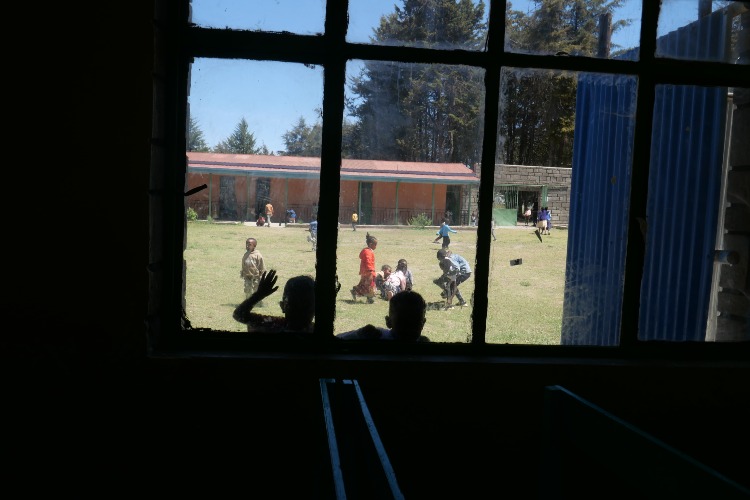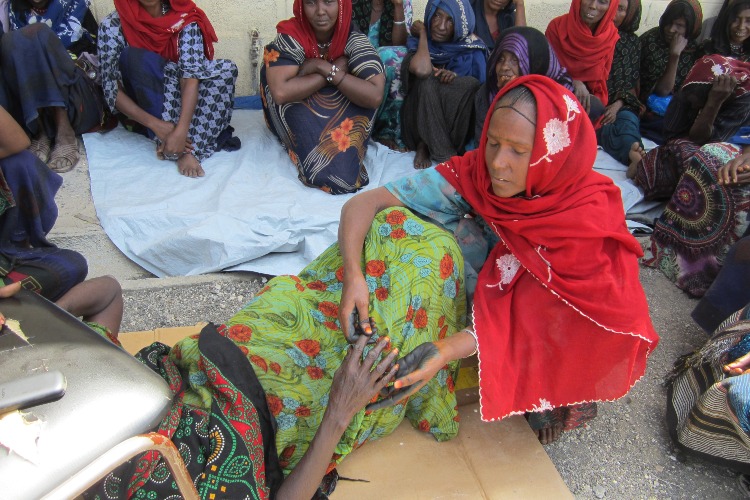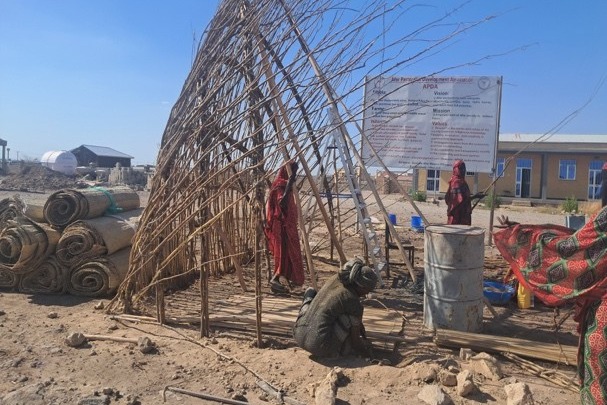Interview with Valerie Browning on female genital mutilation
15 November 2023

.
Valerie Browning AM, the Australian nurse, co-founder and program director of the Afar Pastoralist Development Association (APDA), explains the complexities of female genital mutilation (FGM) and what we can all do to help end it.
.
1. Why is FGM performed on infants and young girls? What are the risk factors that lead to FGM?
Female genital mutilation is an ancient cultural practice stemming back to Pharaonic times in Egypt. It is pre-Islamic and is done to “protect” the female from anyone touching her, other than her husband. As years and years passed, the Afar began to believe – untruly – that this was needed under Islam to purify the girl from perversity.
The risk factors are many; if the girl is from a remote, rural area where illiteracy is high and outside information low, she will almost inevitably experience one form or another of FGM.
2. Can you tell us about the health consequences of FGM? What is the correlation between FGM and fistula?
The most immediate consequence is bleeding and the baby or child may bleed to death or die of shock from the extreme pain. Later, a common difficulty is passing urine since the urethra is pressured by the FGM scar. Retained urine can go on to cause bladder and kidney infection. Also, if the scar fuses over the vaginal opening, then clotting and infection can occur from the obstructed flow of menstrual blood. When the girl gets married, then intercourse is very difficult and painful.
Later, when she has a child, she will have to be opened up with the traditional birthing knife. If she is not, this can obstruct the passage of the baby, cutting off blood supply to tissue in the pelvis and creating a hole – or fistula – between the vagina and bladder/rectum.
3. FGM has been going on for hundreds of years - how do women not realise the health problems they've experienced are because of their FGM? And further to this, why would they pass this tradition down to their daughters when it has caused them so much pain?
Afar society is almost utterly illiterate, except for recently introduced literacy and education in the last 20 or so years. In many areas still they do not have this opportunity. Therefore, they totally depend on traditional thinking and knowledge and simply accept it is right despite the pain and problems. Also, because the deep belief is that it is shameful not to have FGM, the women continue to perpetuate it regardless of the pain.
4. What is the prevalence of FGM in Afar compared with the rest of Ethiopia?
According to UNICEF’s data in 2020, 65% of girls and women aged 15 to 49 have undergone FGM across Ethiopia. But if you look at Afar specifically then this goes up to 91%.
5. Can you give us an overview of APDA's solution towards ending FGM? Is it more health or education focused? If one more than the other - why?
We are both health and education. Providing reproductive health services to all is utterly necessary so women and girls can get treated for the problems they suffer. But awareness is the key for us. FGM will stop but it takes much time and awareness. For awareness, literacy and basic education is vital - otherwise the Afar only have the traditional thinking to depend on. The actual stopping [of FGM] is in the hands of the traditional leaders; clan and religious leaders who are the gatekeepers of community behaviour and morality. Teaching them about the dangers of FGM and that FGM is not desired by Islam is the turning point to getting them to condemn and stop this.
6. What are APDA's objectives and target regions for ending harmful traditional practices in 2024?
From 2024 to 2029, APDA is establishing a further five-year strategy that must emphasise education first as well as sustainability of social services in the vast areas where government does not reach. Our target areas supported through Ethiopiaid Australia are Awra, Gawwaani and Kori. For sustainability, APDA and the community must work from many directions from income generation for locals to securing service people in the community including the teacher, health worker and Woman Extension Worker. Woman Extension Workers are essential to the process since they are the pillar of contact and service for women and girls in the community. In the west [western world], this is a social worker. She is able to find out and see the intention of the community, to stop harmful practices and she works also on maternal health, marriage issues, hygiene, sanitation and much more. Her aim is to provide practical solutions for the issues females face.
7. Have these target regions been affected by conflict and malnutrition?
Currently, due to extreme food insecurity the entire region is in hunger, particularly in remote areas. Conflict seriously affected Awra and continues to affect Gawwaani. Malnutrition is almost catastrophic in many places, especially Gawwaani. Kori is also worsening due to locusts.
8. For 30 years, APDA has been working to end harmful traditional practices. What are some big picture results you’ve seen in ending FGM in Afar?
20 years ago, Afar was universally more severe in the form of cutting they practiced and FGM was [practiced in] almost 100% [of the region]. Now there are pockets where all cutting has stopped. In areas where it still occurs, most now practice the “lesser form” of removing the clitoris rather than sewing up till the vagina is a pinhole.
The Afar are now aware this an issue for debate, rather than accepting and unquestioning the practice. They are aware that maternal health services are available and APDA has hugely increased these services, such as through the Barbara May Maternity Hospital we built in Mille.
Traditional Birth Attendants who are essential for the delivery of the baby are now aware through training that FGM and other harmful practices they believed in like child marriage are dangerous. It might never be possible to train all TBAs so this needs ongoing monitoring, awareness and literacy.
What is a huge picture result is that clan leaders and religious leaders are now coming to the point of seeing any form of cutting as wrong. In January this year, the first ever conference of traditional leaders was held with 100 clan and religious leaders from 25 districts of Afar. They are now in the process of adding FGM as a crime to their traditional law so it can be punished and stopped.
9. What are your thoughts on the United Nation’s goal to eradicate FGM by 2030? Do you think it’s feasible?
From my perspective in Afar, it won't happen. The UN is often dealing with top-down government legislation. FGM is already illegal in Ethiopia but in remote communities like Afar, they do not know the government. The people who actually implement the practice are traditional, so the practice has to be stopped by traditional leadership. Setting a timeframe is difficult. Remember this is a tradition that has been going on for centuries – it won’t be stopped overnight, it’s hard to say if it will be stopped in seven years, but in time and with our continued perseverance, yes, it will be stopped.
10. What can we do from Australia to help put an end to FGM?
Supporting literacy and education is extremely important as well as continuing to train, equip and send out Woman Extension Workers. When trying to stop or change harmful practices, the people and communities need support and structure to turn to – this is what our literacy, education and Extension Workers bring.

.
Learn more about Valerie's incredible work in her book 'Maalika: My Life among the Afar Nomads of Africa'
...and get a glimpse into one of the most remote and isolated regions of Ethiopia.
For every book sold, proceeds go back into local healthcare and education in Ethiopia.
Follow the extraordinary life of Australian nurse and Ethiopiaid's long-time project partner, Valerie Browning AM in her gripping biography, "Maalika: My Life among the Afar Nomads in Africa". After volunteering to help the victims of Ethiopia's famine in 1973, little did she know that her life - and the lives of countless people in Afar - were about to change forever.
Follow her journey as she co-founds our partners, the Afar Pastoralist Development Association (APDA) and dedicates her life for the human rights of people in one of the most remote and isolated regions of Ethiopia.
When you buy your copy of "Maalika" from us, proceeds from your purchase go back into local healthcare and education in Ethiopia and continue Valerie's mission to help those most in need.
The link above takes you to our secure Shopify site where you can make your purchase. This is a limited-edition copy, printed exclusively for Ethiopiaid Australia.
Thank you for being part of positive change for people most in need in our world.

.png)



